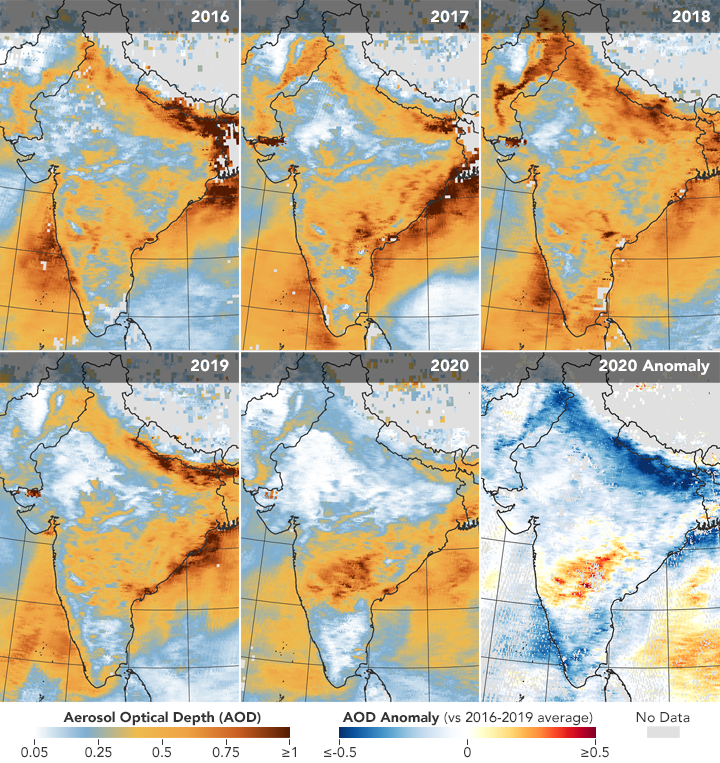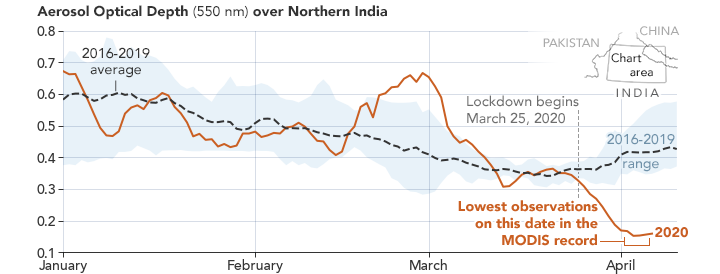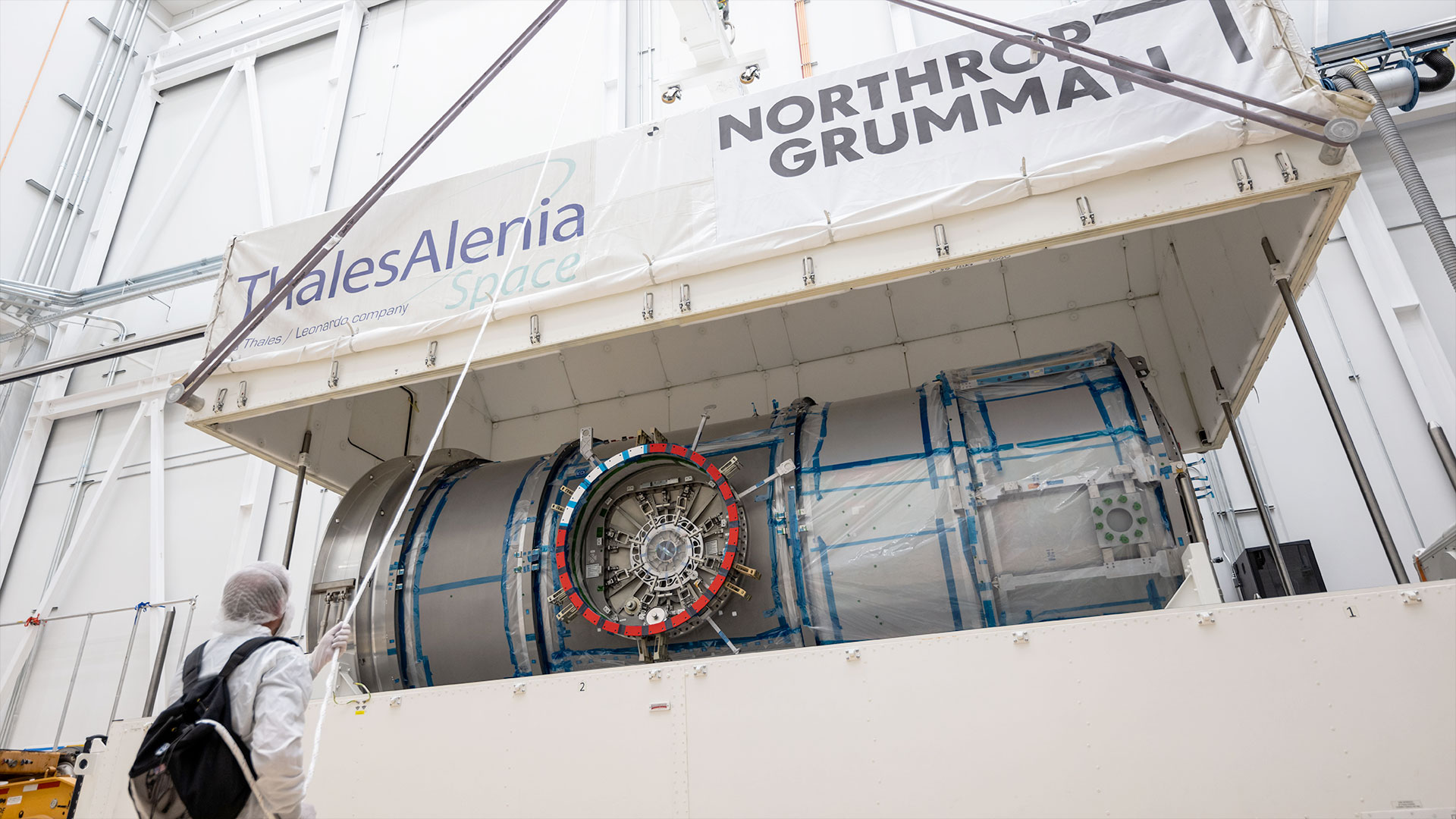Air pollution over northern India drops amid coronavirus lockdown
"I have never seen aerosol values so low in the Indo-Gangetic Plain at this time of year."

Air pollution has plummeted over northern India during the country-wide lockdown, implemented to slow the spread of the novel coronavirus.
On March 24, India put its 1.3 billion citizens into a strict lockdown. Non-essential businesses were temporarily closed, factories have decreased activity, domestic and international flights have been suspended, ground travel has decreased and people across the country are working to try and perform social distancing as much as possible.
With such a quick and drastic decrease in human activities, NASA satellites have detected the lowest aerosol levels in 20 years over northern India.
Related: India's space agency pauses rocket launches to make coronavirus supplies
Aerosols from human sources like motor vehicles and factory production hugely contribute to air pollution. High levels of aerosols have been a major factor in unhealthy, high levels of air pollution throughout India, especially in urban areas. The smaller particles that make up human-made aerosols, as compared to the typically larger particles in natural aerosols from sources like dust storms or forest fires, can be even more damaging to human health. So this drastic decrease in aerosols could be a small silver lining amidst this global pandemic, even if the effect is only temporary.
"We knew we would see changes in atmospheric composition in many places during the lockdown," Pawan Gupta, a Universities Space Research Association (USRA) scientist at NASA's Marshall Space Flight Center in Huntsville, Alabama, said in a NASA statement. "But I have never seen aerosol values so low in the Indo-Gangetic Plain at this time of year."
In the map above, you can see the drastic difference, as observed by the Moderate Resolution Imaging Spectroradiometer (MODIS) instrument on the Terra satellite, one of NASA's earth-observing missions. These images show aerosol optical depth measurements over India between March 31 and April 5 every year from 2016 to 2020. And, in the most recent image, it is easy to see how significantly aerosols have diminished in the atmosphere.
Get the Space.com Newsletter
Breaking space news, the latest updates on rocket launches, skywatching events and more!

Weather, wind and natural sources of aerosols all impact the levels of aerosols in the atmosphere. So it can be difficult to say exactly how much of what is observed comes from humans and, therefore, exactly how much the lockdown is affecting air pollution.
"The hard part with understanding aerosols is that particles can move based on wind patterns and other meteorology," Robert Levy, program leader for NASA's MODIS aerosol products, said in the same statement. "You have to disentangle what is caused by the human fingerprint versus a meteorological factor."
But there has been a significant enough change to show that aerosols aren't dipping low because of any routine reason. For example, in the first week of the shutdown there was a decrease in aerosols, but there was also heavy rainfall, which can clear aerosols out of the air. But typically, after heavy rains like this, aerosol levels increase as things "return to normal."
"After the rainfall, I was really impressed that aerosol levels didn't go up and return to normal," Gupta said. "We saw a gradual decrease, and things have been staying at the level we might expect without anthropogenic emissions."
"This [is] a model scientific experiment," Levy added about the decrease in pollution caused by the strict lockdown. "We have a unique opportunity to learn how the atmosphere reacts to sharp and sudden reductions in emissions from certain sectors. This can help us separate how natural and human sources of aerosols affect the atmosphere."
India will remain in this strict lockdown until May 3, though some aspects of the lockdown have been altered to better support essential employees in the country. Currently, the country has seen 18,985 confirmed cases of the novel coronavirus and 603 residents have so far lost their lives.
- Shutdowns from coronavirus create blue skies in California
- NASA satellite sees air pollution drop over northeastern US amid coronavirus
- Seeing coronavirus impacts from space: Before-and-after satellite photos
Follow Chelsea Gohd on Twitter @chelsea_gohd. Follow us on Twitter @Spacedotcom and on Facebook.
OFFER: Save 45% on 'All About Space' 'How it Works' and 'All About History'!
For a limited time, you can take out a digital subscription to any of our best-selling science magazines for just $2.38 per month, or 45% off the standard price for the first three months.
Join our Space Forums to keep talking space on the latest missions, night sky and more! And if you have a news tip, correction or comment, let us know at: community@space.com.

Chelsea “Foxanne” Gohd joined Space.com in 2018 and is now a Senior Writer, writing about everything from climate change to planetary science and human spaceflight in both articles and on-camera in videos. With a degree in Public Health and biological sciences, Chelsea has written and worked for institutions including the American Museum of Natural History, Scientific American, Discover Magazine Blog, Astronomy Magazine and Live Science. When not writing, editing or filming something space-y, Chelsea "Foxanne" Gohd is writing music and performing as Foxanne, even launching a song to space in 2021 with Inspiration4. You can follow her on Twitter @chelsea_gohd and @foxannemusic.
-
vance_lunn I caution people against thinking of this reduction in pollution as an environmental victory. It is low because people worldwide are essentially imprisoned in their homes and are not living life. Even with the cleaner air, the quality of life is lower than it is with the pollution and normal life activities. True environmental victory can be declared when people can do everything that they normally do, and more, with clean air.Reply










